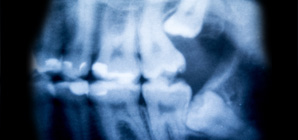Wisdom Teeth
 Wisdom teeth, also known as your Third Molars, are the last teeth to erupt in the mouth. When they emerge properly with the rest of your teeth, and the surrounding gum tissue is healthy, wisdom teeth do not necessarily need to be removed. Many adults have all 32 of their permanent teeth, but the average mouth is made to hold only 28 teeth, making the last 4 molars (the wisdom teeth) a sometimes painful addition to the patient's mouth.
Wisdom teeth, also known as your Third Molars, are the last teeth to erupt in the mouth. When they emerge properly with the rest of your teeth, and the surrounding gum tissue is healthy, wisdom teeth do not necessarily need to be removed. Many adults have all 32 of their permanent teeth, but the average mouth is made to hold only 28 teeth, making the last 4 molars (the wisdom teeth) a sometimes painful addition to the patient's mouth.
When the wisdom teeth are prevented from properly erupting, they may then grow sideways, partially emerge, or remain within the gum and bone. When the teeth are trapped like this, they are called impacted wisdom teeth and can cause many problems. For instance, if the wisdom tooth is partially showing above the gumline, the small gap around the tooth often allows bacteria to grow and usually causes infection. The unpleasant symptoms are pain, swelling, and jaw stiffness. Just the pressure from a wisdom tooth trying to erupt can be painful around the entire general area of the mouth.
The simple surgical removal of the wisdom teeth resolves most of these problems. Preventative removal is encouraged to avoid painful situations, and to minimize the surgical risk of removing these teeth when the procedure is actually preformed. Most doctors suggest screening for wisdom teeth in the mid-teenage years. This early detection of future problems coupled with the treatment of wisdom teeth through surgical removal, leads to a patients best results.
